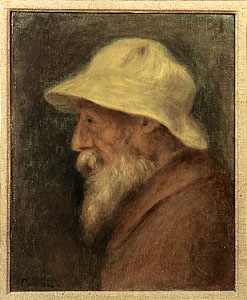The directory «Artists»
Renoir Pierre Auguste
(1841—1919)

French impressionist painter and sculptor, b. Limoges. Renoir went to work at the age of 13 in Paris as a decorator of factory-made porcelain, copying the works of Boucher. In 1862 he entered M. C. Gleyre’s studio, where he formed lasting friendships with Bazille, Monet and Sisley. His early work reflected myriad influences including those of Courbet, Manet, Corot, Ingres and Delacroix. He began to earn his living with portraiture in the 1870s; an important work of this period was Madame Charpentier and her Children (1876; Metropolitan Mus.). Simultaneously he developed the ability to paint joyous, shimmering color and flickering light in outdoor scenes such as The Swing and the festive Moulin de la Galette (both: 1876; Louvre). Renoir traveled in Algeria and in Italy (1881–82), returning to Paris where a successful exhibition (1883) established him financially. He had gone beyond impressionism. His ecstatic sensuality, particularly in his opulent, generalized images of women, and his admiration of the Italian masters removed him from the primary impressionist concern: to imitate the effects of natural light. After a brief period, often termed “harsh” or “tight,” in which his forms were closely defined in outline (e.g., The Bathers, 1884–87; private coll.), his style of the 1890s changed, diffusing both light and outline, and with dazzling, opalescent colors describing voluptuous nudes, radiant children, and lush summer landscapes. From 1903, Renoir fought the encroaching paralysis of arthritis at the same time that his work attained its greatest sensual power and monumentality. Despite illness and personal tragedy he began to produce major works of sculpture (e.g., Victorious Venus, Renoir Mus., Cagnes-sur-Mer). Among his most celebrated paintings are: Luncheon of the Boating Party (1881; Phillips Coll., Washington, D.C.); Dance at Bougival (1883; Mus. of Fine Arts, Boston); Lady Sewing (Art Inst., Chicago); and Bather (1917–18; Philadelphia Mus. of Art). Renoir’s work is represented in most of the important galleries in the world. The Art Institute of Chicago; the Barnes Collection, Merion, Pa.; Clark Institute, Williamstown, Mass.; and the Louvre have large collections. His son, the film director Jean Renoir, wrote a biography (tr. 1962).
Guinea, 2007, Lute Player